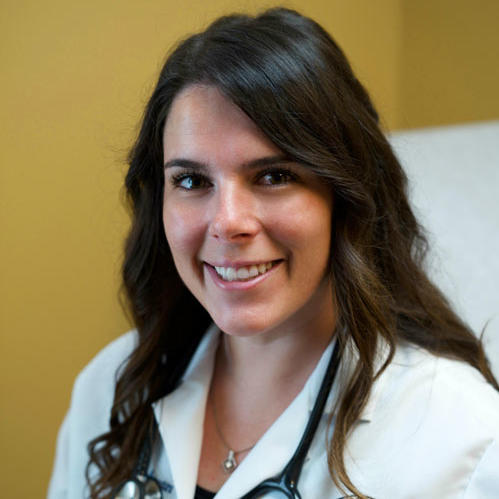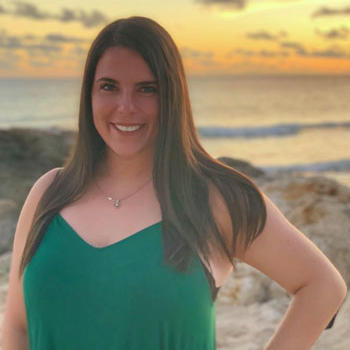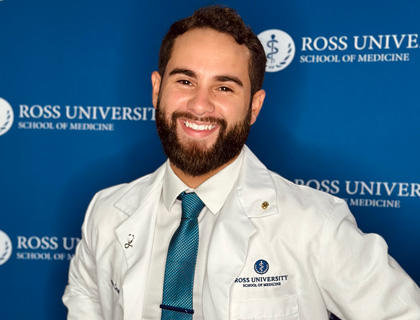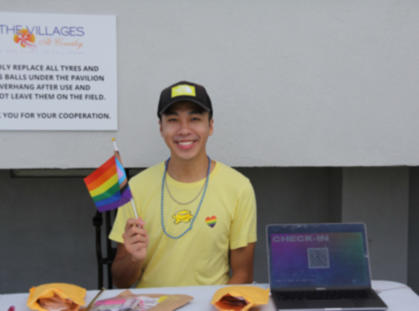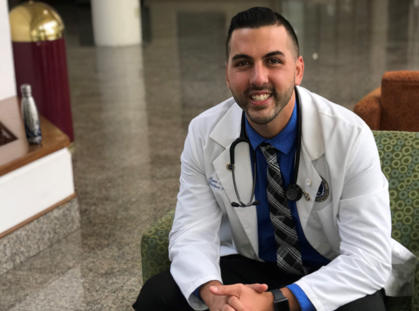Finishing undergrad as a chemistry major, she thought her study habits were pristine and would help her coast through medical school, but she quickly learned otherwise. On orientation day, Ross University School of Medicine (RUSM) fifth-semester medical student Leah Hochman sensed a challenge and buckled up for the ride.
“The first semester is a fire hydrant of information that keeps coming at you,” she recalled. “With undergrad, you got it in small bursts but with med school, you’re learning so many different things so quickly that you have to find ways to compartmentalize. It’s a marathon, not a sprint.”
Learning efficiency was Leah’s first task and she’s changed the process as needed throughout her tenure. "I did not do the same thing first semester as I did fifth.” She skipped the accelerated option, knowing she’d need more time to process, study and retain the information. Leah calls the curriculum grueling and though it can be stressful, she also finds it completely rewarding.
Know What’s Ahead
“It’s like you’re on a playground going through a covered slide on a really hot summer day, wearing shorts. You’re burning your legs and they may be a little scorched, but you get through it. It’s all about delayed gratification. If you’re in it for the long haul, then at end of the day, you’ve made it because you know what you’ve signed up for.”
During first semester, Leah created one-page study guides to help her process the material but switched to flash cards in third semester. “People are afraid to change the way they learn and that’s a downfall. Don’t get stuck doing it one way, getting mediocre results. Take a leap of faith and tweak it to find a better way.”
Leah would know best. She missed passing second semester by a small margin, and thus began studying with a peer who endured the same fate. The pair studied together for at least eight hours a day, talking out the lectures and quizzing each other; resulting in high marks for both. Her study partner switched to the accelerated track for third semester but Leah stayed put, knowing her limits.
Keeping It Real
Now ready to bring textbook learnings to life, Leah will start Internal Medicine Foundations (IMF) this month. Though she debated about when to take the step 1 exam, she decided to wait until after IMF to better prepare. “They tell you to start studying for step on day one. I didn’t take it 100% seriously until the end of fourth semester.” She’s dedicated seven weeks to hitting the books so far and will continue mastering the material during IMF.
Living in Louisville since COVID-19 derailed her Barbados stay, Leah has been eager to land in Miramar, closer to her native roots of central Florida. “I had an inkling we wouldn’t go back to island and I’m a little sad that I didn’t get to close that chapter with a last hurrah at the beach. Barbados had become my second home. Regardless of how that ended, I just can’t wait to be back with my Rossie family.”
Leah understands IMF will look different with the pandemic, but she doesn’t think it will alter the direction of medicine. “We will still treat patients the same. I think I’ll just see more exhausted doctors putting in a lot of hours and dealing with all this new stress.”
Helping Others
An advocate for mental health, Leah looks forward to the psychiatry rotation. “In Kentucky, I noticed there were a lot of homeless people trying to cope with mental illness. There’s such a huge disparity in mental health. As medical students, we live very stressful lives and do not necessarily take care of ourselves. There’s a lot of pressure for us to be the best we can be at the expense of our health and mental health. Ross University does a great job of offering programs that teach coping skills and mechanisms. We need to take what we’ve learned to help those with undiagnosed mental-health disorders.”
Watching her father treat sick patients through his radiation oncologist specialty, Leah always knew medicine was her calling. Besides psychiatry, she’s also considering urology because it’s a male-dominated field she’d like to break through. “I would love to be able to cater to the female population. It’s important that we make an impact and we’re there to make our gender feel more comfortable. In the last 10-15 years, females are becoming more dominant in all the medical fields and I’d like to continue to lessen the disparity among female doctors.”
Road to Residency Library
Exploring Ways to Keep You Engaged During this Time of Limited Patient Interaction
If you have a topic you’d like to learn more about, please share your feedback with us.

